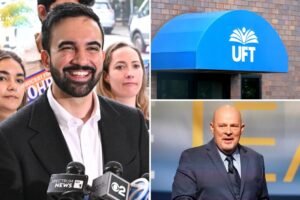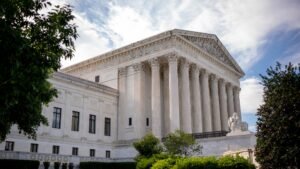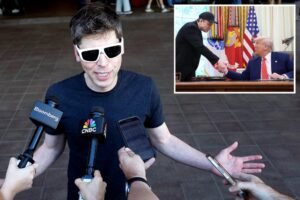
Japan accuses the Tokyo Caliphi of the “error” in the American commercial conversations strategy
Digest opened free editor
Rola Khaleda, FT editor, chooses her favorite stories in this weekly newsletter.
The head of one of the strongest businesses in Japan accused the government of a “mistake” in its strategy to negotiate with the United States, after President Donald Trump announced 25 percent on the nearest Asian ally in Washington.
Takishi Ninami, CEO of Suntory Company and President of the Association of Executive Directors of influential Japanese influences, said, ” JapanThe insistence of a complete exemption from Trump’s tariff may have left the American president to feel “betrayal”, adding that the country could have obtained a 10 percent rule tariff if its negotiations showed more flexibility.
“They reduced Trump’s appreciation,” Ninami told the Financial Times on Tuesday. “They thought the time was next to Japan. It was a big mistake.”
He said that Tokyo is now equally and could be forced to make great concessions to secure a deal. Ninami added that there is a narrow window to conclude this deal before the House of Representatives elections this month, when the ruling liberal Democratic Party of Prime Minister Shigro Ishiba rises by losing his grip on power.
Ninami said: “It may be too late.”
Japan was quick to start negotiations this year in the hope of obtaining relief from Trump’s tariff with a fast -track deal. But the American president on Monday A 25 percent tariff revealed In the country – one percentage point is higher than it was initially announced in April – after the talks failed to advance.

Ninami’s explicit comments were unusually after just hours of Trump identifying the new “mutual” tariff levels on a group of American commercial partners in Asia, including South Korea, Malaysia, Thailand and Indonesia. The fees, which were frozen before until July 9, will enter into force on August 1.
HSBC said on Tuesday that Japan may find it difficult to provide more privileges. She said: “The ruling Ishiba coalition is subject to enormous pressure to protect the exporters of car, rice farmers and other decisive electoral districts before the controversial elections of the House of Representatives on July 20.”
This announcement came after weeks of non -fruitful negotiations between Tokyo and Washington, despite the allegations submitted by both sides that progress was made. Trump last week Japan was accused of being “spoiled” To refuse to adhere to purchasing more American rice or allowing the cars that have been manufactured on the market.
Ninami said that Japan’s stubbornness – including Ishiba’s refusal to sacrifice the country’s rice farmers to protect the auto industry – wasted the legacy of former Prime Minister Shinzo Abe, who had warm relations with Trump during the first US term.
“Trump had great expectations from Japan because of Mr. Abe, (and he believes) that Japan could become an offer,” Ninami said. “We needed to analyze this level of expectation.”
Japan has He demanded the continuation of the exemption From Trump’s tariff, quoting the “special relationship” of the allies. According to officials in the United States and Japan, the Trade negotiator in Tokyo Riozi Akazawa, who participated in multiple rounds of phone calls and meetings face to face, was not granted a mandate to give up some land on the definitions.
David Bolling, director of Japanese trade and Asian Trade at the Eurasia Group of Thought and a former US official negotiated a trade agreement with Japan in 2020.
He said: “Japan was badly erred by taking a maximum position that the United States should eliminate all definitions. This strategy was imagination.” “If Japan wants to reach a deal by August 1, it should be more realistic.”
Akazawa spoke with US Secretary of Commerce Howard Lootnick for 40 minutes on Tuesday, according to Japanese officials who said Tokyo negotiator was “permanently ready” to travel to Washington for further conversations.
“The Japanese negotiators should take” a quick approach but was measured by its suspension, motivation and negotiation with the feeling of design. “
Mitsunbu Koshiba, the director of many leading Japanese companies, suggested that Japanese groups have the ability to absorb definitions due to the weak yen.
He said, “Today I will be happy to take 145 yuan in exchange for definitions,” compared to the level of about $ 110 per dollar during the first Trump administration.












Post Comment